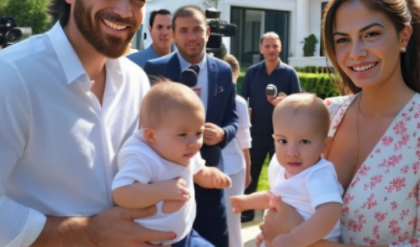Romantic and sensitive, young Charles had little in common with his straightforward, undemonstrative mother, but as decades passed, the duo developed a close, warm bond.

BY TIM GRAHAM/GETTY IMAGES.
In early February, Queen Elizabeth announced it was her “sincere wish” that when Prince Charles becomes king, his wife, Camilla, Duchess of Cornwall, be given the title of queen consort. At the time, a spokesperson for Charles and Camilla said the couple was “touched and honoured” by the queen’s proclamation.
The statement-making gesture could also be seen as a gift from the 95-year-old monarch to Charles, and a blessing of the choices he’s made. The heir to the throne has always craved approval from his mother, and before her death, the queen seemed to be signaling confidence in the future King Charles III.
It wasn’t always this way. According to Robert Jobson’s King Charles: The Man, the Monarch, and the Future of Britain, for a time the queen and her husband, Prince Philip, saw Charles as a somewhat “loose cannon.” Romantic and sensitive by nature, he had little in common with his straightforward, undemonstrative parents. As his biographer Sally Bedell Smith writes in Prince Charles: The Passions and Paradoxes of an Improbable Life, when Lady Pamela Hicks was asked which parent Charles was most like, she quipped, “I think he must be a changeling.”
Prince Charles was born on November 14, 1948. According to Kitty Kelley’s The Royals, the then Princess Elizabeth insisted that she wanted her first child “to be born in my own room, amongst the things I know.” She breastfed for two months, and the baby slept in the room next door. “I am going to be the child’s mother, not the nurses,” she said, per Kelley.
But just four years later, these plans went out the window when the queen ascended the throne at the age of 25. “I think any idea of a family in the normal sense was knocked on the head by the queen’s accession at such an early age,” biographer Philip Ziegler told Kelley.
BY LISA SHERIDAN/GETTY IMAGES.
The queen was now facing overwhelming responsibilities and a daunting schedule of royal activities. She made time to teach Charles to horseback ride and would see him after breakfast and tea. Occasionally she would come to watch him be bathed, and Charles recalled her entering the bathroom while she practiced wearing the heavy St. Edward’s Crown. “Mummy [was] a remote and glamorous figure who came to kiss you goodnight, smelling of lavender and dressed for dinner,” Charles recalled. According to Kelley, when his sister, Princess Anne, refused to leave their mother, he would drag her away, explaining: “Anne, you must not bother Mummy. She’s busy. She’s queening.”
“I think everything that we know points to the fact that it was distant,” says royal commentator Richard Fitzwilliams. In 1953, the newly crowned Elizabeth and Prince Philip went on a six-month tour of the commonwealth, leaving Charles and Anne. According to Jobson, Elizabeth cried as she left them, but it was her actions upon their return which caught the public’s eye. Kitty Kelley writes:
[Charles] had not seen her for six months, so he raced on board the Britannia to welcome her home. He ran up to join the group of dignitaries waiting to shake her hand. When the Queen saw her young son squirming in line, she said, “No, not you, dear.” She did not hug him or kiss him; she simply patted his shoulder and passed along to the next person.
But the young prince was not completely void of snuggles and warmth, which were provided by his beloved nanny, Mabel Anderson. “For Prince Charles, who had already discovered that only in the nursery could he always be assured of a cuddle, Mabel Anderson became ‘a haven of security, the great haven’ to whom he invariably turned first for comfort and support,” Jonathan Dimbleby writes in The Prince of Wales: A Biography, with which Charles cooperated.
In his own family, Charles found a soulmate in his grandmother Elizabeth, the Queen Mother, the first in a long line of older matriarchs the prince would become close with. The Queen Mother, who Charles called “the most magical grandmother you could possibly have,” nurtured his love of arts and culture, taking him to performances and nursing him when he was sick and his parents were away.
According to Smith, the Queen Mother also advocated on Charles’s behalf against a formidable advisory: Prince Philip. As Fitzwilliams notes, the queen, overburdened with duties, let her husband often make decisions regarding their children. According to Dimbleby, Philip often bullied his son and worked hard to toughen him up.
“Observing friends were also frustrated by the failure of the child’s mother to intervene by protective word or gesture,” Dimbleby writes. “She was not indifferent so much as detached, deciding that in domestic matters she would submit entirely to the father’s will.”
While this parental estrangement deeply affected Charles, it was not uncommon for aristocrats of his time. “The relations between parents and children were very different in those days. And Princess Anne wasn’t troubled by it. But then she had a different character and, of course, was very much her father’s daughter,” says Fitzwilliams. “I do think he had very different needs and I think they weren’t capable [of meeting them].”
There was also the simple fact that Charles and his family had very little in common. “Once when Charles tried to share his excitement over the Leonardo da Vinci drawings in the library at Windsor Castle, his parents and siblings were merely ‘bemused,’” Smith writes.
As young Charles grew into adulthood, Smith writes “he retreated more and more into formality with his parents,” usually forced to schedule meetings if he wanted to see them and reading of their goings-on through a schedule sent around every day. He seemed eager to impress his mother and to perform the increasing duties she bestowed on him, writing to Patricia Mountbatten, per Smith, that he was “so glad to be able to do something like that for Mummy.”
FROM GETTY IMAGES.
The queen, now more comfortable with her role, was able to enjoy more time with her younger sons, Andrew and Edward, which may have caused Charles considerable pain. “Andrew was the Queen’s favorite son—that was the bottom line. Everyone in the family knew it. Elizabeth II had always been uncomfortable with the cerebral and sensitive Charles, forever debating the whys and the wherefores,” Robert Lacey writes in Battle of Brothers.
In response, Charles seemed to find surrogate maternal figures, like Deborah Cavendish, Duchess of Devonshire, the poet Kathleen Raine, and new age thinkers like Indian actor Zoe Sallis. According to Smith, royal counselors called it the Prince of Wales “guru problem,” and Raine told a friend the queen thought her son a “hopeless eccentric.”
Charles also turned to his great uncle Louis Mountbatten for advice and emotional support. According to Fitzwilliams, it was likely Mountbatten’s remarkably dated views on who Charles should marry that allegedly helped influence Charles to court and marry Diana. Charles felt unable to confide in his parents about his marital problems and turned instead to friends, and eventually Camilla Parker Bowles. Dimbleby writes:
…He was unable to turn to his parents to discuss the misery either of his private life or of his public persona. Their response to his charitable endeavors was incurious, while he was rarely left in doubt that they did not entirely welcome his contributions to controversial debate. The emotional gulf between the Prince and his parents was hard to bridge, while communication between them was normally limited to the exchange of social pleasantries and the formal business of the family enterprise.
There was also the natural tension between mother and son over the delicate fact that until the queen’s abdication or death, her son would forever be in limbo. According to Smith, Charles was occasionally heard to ask, “Why doesn’t she abdicate?”
Prince Charles’s frustrations boiled over in 1994, when Dimbleby’s autobiography was released. He had granted extensive interviews with Dimbleby for the book, which painted his parents as remote and unfeeling (not dissimilar to Prince Harry and Meghan Markle’s bombshell interview with Oprah Winfrey in 2021). “There was resentment in the royal family that he used Jonathan Dimbleby to complain about it,” Fitzwilliams says. Not only were Charles’s parents hurt, his siblings were as well. Princess Anne said the insinuation her parents were not caring was “just beggars belief,” per Smith.
However, more recently, as the queen began to recognize Charles’s enormous charitable contributions, and as he’s settled into a happy life with Camilla, it seemed their mother-son relationship improved. “As time has passed, they have got closer,” Fitzwilliams says “I think there’s no doubt that I think he tremendously admires his mother. I think that there is a strong mutual respect.”
They also shared several interests, including a love of the country, excellent comic timing, and as Dimbleby notes, “a similar sense of the ridiculous.” This was on display in 2014 during an event at Royal Albert Hall, as Prince Charles paid tribute to his mother in front of a star-studded crowd. Jobson writes:
At first he respectfully and properly called her “Your Majesty” throughout, but then decided to get a little too personal, calling her “Mummy.” At that precise moment Queen Elizabeth’s eyes grew extremely wide, drawing huge laughs from the crowd. Charles, with his perfect comic timing, knows exactly how to play an audience, and so does the Queen.
These public displays of warmth between the queen and her heir proved to be excellent promotional tools for the monarchy. “When there is a form of public intimacy, like the word Mummy or whatever between them, I think that that goes down very well with the public,” Fitzwilliams says.
In 2016, Prince Charles helped spearhead the documentary Elizabeth at 90: A Family Tribute. “The most affecting segments showed Charles and his mother, side by side…in an ornate palace drawing room,” Smith writes. “As they lit up with recognition of long-ago memories—her mental acuity on full display in her quick and accurate recollections—they chuckled and chatted. The warmth of their relationship was unmistakable.”
It has been reported that the queen shared dispatch boxes with Prince Charles, and deferred increasingly to him as he essentially operated as a “shadow king” in the time before her death. Charles has long advocated for slimming down the monarchy, and reportedly took the lead in the palace’s response to Prince Andrew’s scandals and downsizing the royal footprint.
It remains to be seen what lessons Charles will take from his mother when he ascends the throne. “She’s unique in the way she has carried out the role. Charles cannot possibly, nobody could emulate her. And his views on many things are known and, of course, hers aren’t,” Fitzwilliams says.
But as she grew older, the queen became more expressive about her view of her eldest son. In 2018, she toasted Charles at his 70th birthday party, with a speech that showed the love behind her reserved facade.
“I have seen Charles become a champion of conservation and the arts, a great charitable leader—a dedicated and respected heir to the throne to stand comparison with any in history—and a wonderful father,” she said. “Most of all, sustained by his wife, Camilla, he is his own man, passionate and creative. So, this toast is to wish a happy birthday to my son, in every respect a duchy original.”







